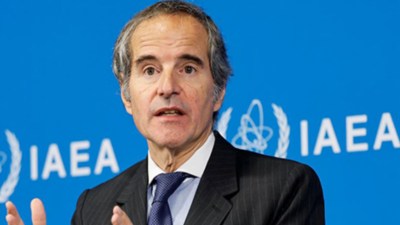As India languishes in spiritual complacency in an era where spirituality has been dumbed down to feel-good self-help slogans, pseudo-spiritual practices, or commercialized wellness, Acharya Prashant has emerged as a fierce and disruptive voice—one as intellectually challenging as it is philosophically grounded. At first glance, Acharya Prashant is hardly the image of the stereotypical spiritual guru. No flowing robes, no dramatic hair—just a neatly dressed man who could pass for any urban intellectual. A graduate of IIT Delhi and IIM Ahmedabad, he enters a room more like a professor than a master. And yet his words hold a profound intersection of timeless wisdom and searing contemporary understanding.
No surprise therefore that his readers and listeners have begun to draw historical parallels — to see in him reflections of some of India’s greatest spiritual figures and reformers.
Carrying Adi Shankaracharya’s Flame Of Non-Dual Inquiry Into The 21st Century
“His clarity, precision, and method of inquiry—he reminds me of Adi Shankaracharya,” says Prof. Rao, a Vedanta scholar and professor. “Adi Shankara was not just a mystic, he was a philosopher who debated, questioned, and dismantled illusions. Acharya Prashant does the same—except his arena is the 21st century.”
Indeed, like the 8th-century Advaitin, Acharya Prashant takes the non-dual message of the Upanishads and strips it of mysticism, making it accessible—and accountable—to modern minds. In his discourses, videos, and columns, he relentlessly questions rituals, customs, and beliefs that masquerade in the name of spiritual practices. “Only falseness needs to dress up,” he often says, echoing Shankaracharya’s emphasis on direct realization over blind ritualism.
Swami Vivekananda’s Vision Restructured For A Restless Generation
Yet, while he is rooted in Vedanta, his resonance is wide. Among youth,he is often likened to Swami Vivekananda—a parallel not just in intellect, but in intensity. “What Vivekananda did for colonial India, Acharya Prashant is doing for post-modern India,” says Babita, a long-time listener who first encountered his work through a YouTube recommendation. “He’s pushing us to move from everyday comfort to higher consciousness.”
Much like Vivekananda, Acharya Prashant connects spiritual insight with social change. His campaigns for cruelty-free living and eco-responsibility—such as the much-talked-about “Operation 2030” plan—mirror a vision in which inner wisdom, social change and planetary survival are integral to each other. He was recently conferred the ‘Outstanding Contribution in National Development’ award by the IIT Delhi Alumni Association for his outstanding contribution in social leadership.
Question, Observe, Awaken: Jiddu Krishnamurti For The New Digital Age
But if some find his social critiques reminiscent of Vivekananda, others point to a different legacy: that of Jiddu Krishnamurti. The connection becomes clear in his treatment of authority. “You don’t need to believe in me,” Acharya Prashant frequently tells his listeners. “You need to investigate what I’m saying.”
Like Krishnamurti, he challenges blind faith, encourages deep self-observation, and dismantles dependency on gurus. But unlike Krishnamurti, he is not hesitant to refer to scriptural texts or to hymns by saints. In fact, he runs the world’s largest Gita teaching program and has authored deeply original commentaries on the Bhagavad Gita, the Upanishads, and hundreds of other spiritual works, bringing to them a contemporary sharpness that is both literary and meditative.
Facing Suffering, Not Escaping It: The Buddha’s Original Spirit Revived
And then there’s the Buddha. “In his silence, in his attention to suffering, and in his refusal to offer easy solace, I find echoes of Buddha,” says Dr. Kumar, a physician who regularly shares Acharya Prashant’s videos with his patients. “He doesn’t soothe; he wakes you up.”
As the Buddha, Acharya Prashant begins where philosophies always come to an end—at suffering. His words are not meant to embellish life, but to break its greatest restlessness. As the Buddha, he does not offer salvation in the guise of ritual or promise of divine intervention; he offers fierce self-examination and awareness. Where Buddha encouraged people to look behind the mask of ego and desire, Acharya Prashant encourages the seeker of today to question their identities, desires, and borrowed ideology. Both demand direct experience over dogma and talk not to comfort, but to awaken. In a distracted age, Acharya Prashant channels the Buddha’s original spirit, demanding an unyielding commitment to truth and self-awareness.
Truth Without Apology
This power to unsettle, and not to calm, perhaps most distinguishes Acharya Prashant in the hectic spiritual marketplace of the day. He does not promise miracles, manifestation, or mindfulness apps. He promises the truth—and insists you do the work to uncover it. In literary circles, it is rumored that his new book is titled ‘Truth Without Apology’ and will soon be released by HarperCollins. Fittingly, the book’s title reflects Acharya Prashant’s work.
In a world flooded with content and spiritual teachers, his voice is a rarity—severe yet tender, timeless yet immediate. For those who listen carefully, it is not hard to hear the echoes of India’s deepest spiritual masters in his words. Not in imitation—but in spirit.
Also Read: ‘India In Touch With Iranian Authorities For Locating Them’: MEA On Three Indians Missing In Iran












